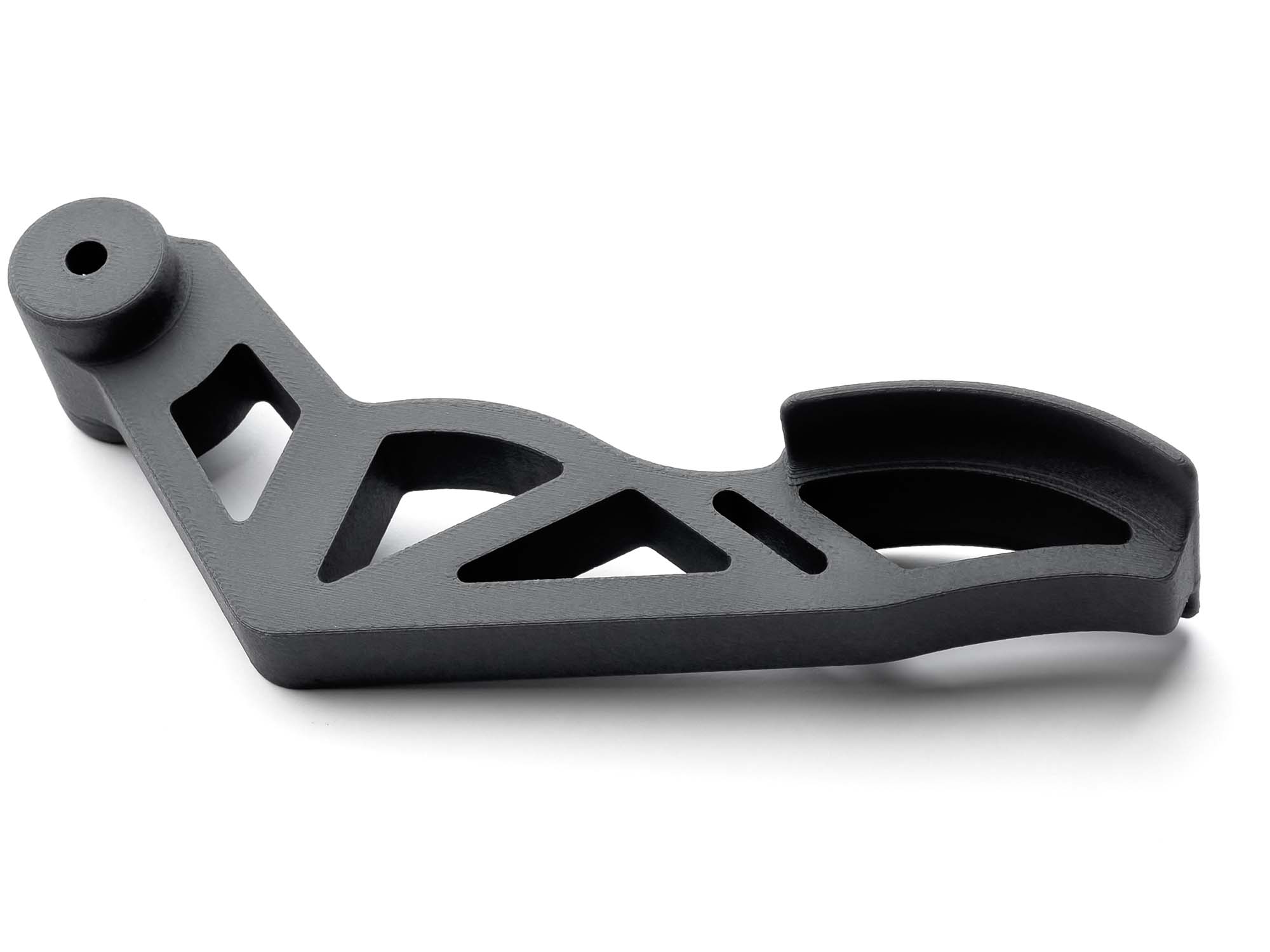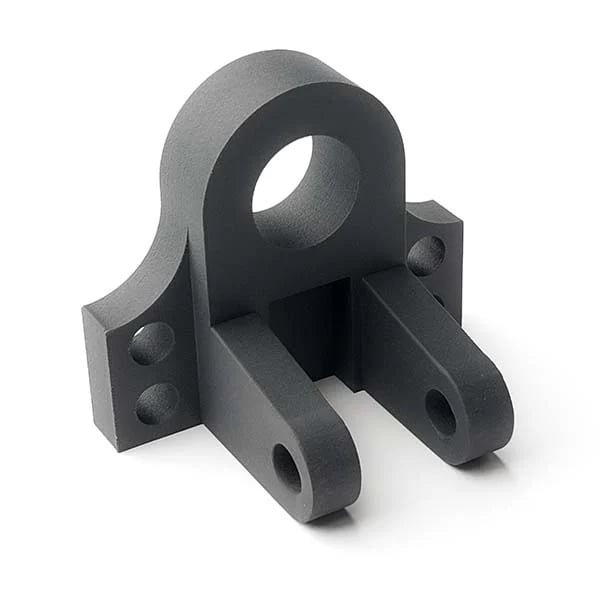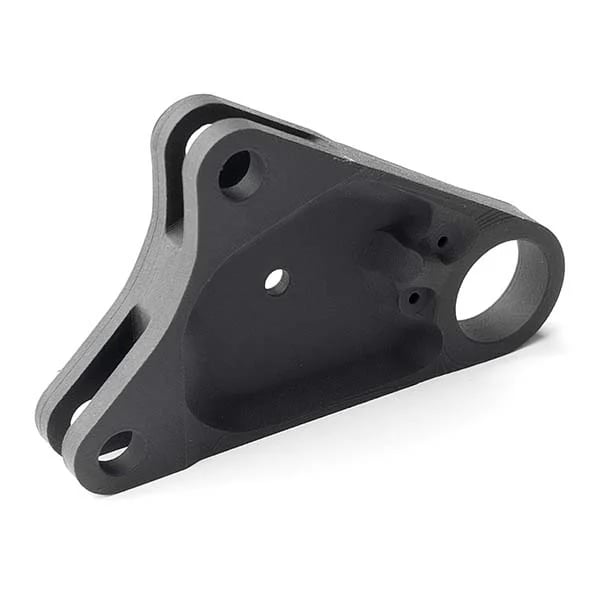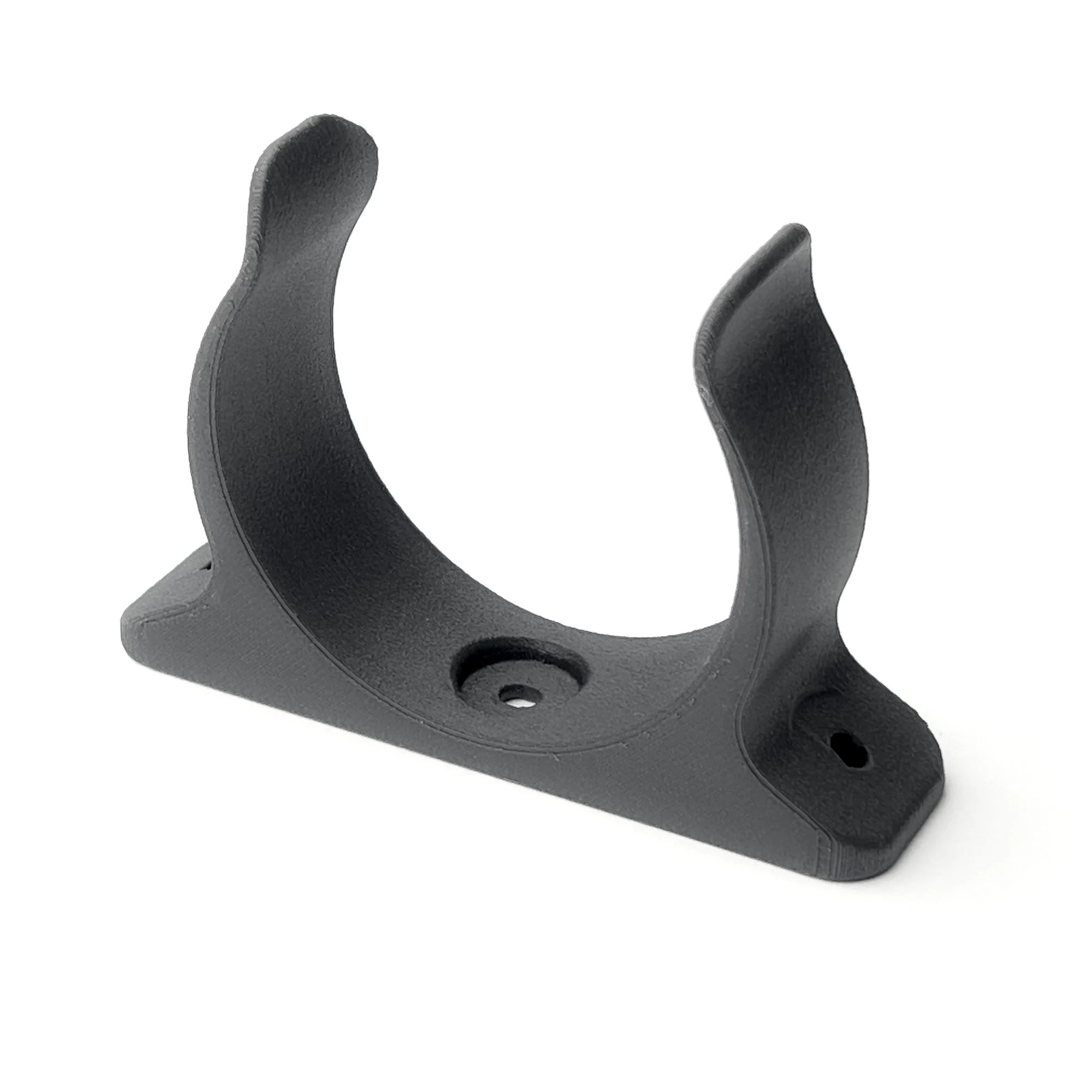Nylon PA12 carbon fiber
Lightweight, rigid and ideal for replacing metal components
PA12 CF nylon is a carbon fibre-reinforced polyamide designed for high-performance applications. It offers high stiffness, low weight, and excellent dimensional stability, making it ideal for metal replacement. 3D printed using FDM technology, it allows for great design freedom and the creation of strong, functional parts.

PROS
- Mechanical and thermal properties
- Rigid and resistant structure
- Lightweight due to 30% infill
CONS
- Limited geometric complexity
- Anisotropic behaviour
- Layers can be visible
MAIN FEATURES
- 3D printing process: FDM
- Tolerance: ±0,60mm < 100mm ; ±0,75% > 100mm
- Max size: 300 x 300 x 300 mm; 11,8 x 11,8 x 11,8 in
- Lead time: <3 days
NYLON PA12 CF 3D PRINTING VIDEO GALLERY
Mechanical and thermal properties
Nylon PA12 CF stands out due to its exceptional mechanical and thermal properties. These properties make it suitable for applications that demand strength, durability, and resistance to temperature variations. Whether it's for parts that will be exposed to mechanical stress or varying temperatures, Nylon PA12 CF ensures consistent performance.
Rigid and resistant structure
The structure of filament of PA12 CF is both rigid and resistant, making it ideal for applications that require stability and durability. Its rigidity ensures that the parts maintain their shape and dimensions even under stress, while its resistance ensures that the parts can withstand external forces and impacts without deforming or breaking.
Lightweight due to 30% infill
One of the standout features of filament with carbon fibre is its lightness, achieved due to a 30% infill in its 3D printing process. This lightness does not compromise its strength, making it perfect for applications where weight savings are crucial without sacrificing the integrity of the part. Whether it's for aerospace, automotive, or any industry where weight is a factor, Nylon PA12 CF offers an optimal balance of lightness and strength.
NYLON PA12 CF GALLERY
QUOTE NOW YOUR PARTS
free instant quoteCOMMENT
Nylon PA12 CF, reinforced with carbon fiber, is a remarkable engineering material that boasts a combination of advantageous properties. Its mechanical and thermal attributes, combined with its rigid and resistant structure, make it apt for demanding applications in 3D printing. While it offers significant advantages like lightness and durability, it does come with certain limitations, especially when compared to traditional materials. However, its overall performance often justifies these aspects, making it a versatile choice for a multitude of industries, from aerospace to automotive.
Pros
• High Mechanical and Thermal Properties
Nylon PA12 CF exceptional mechanical and thermal properties make it essential in applications that require resilience and resistance to temperature variations. Its high yield strength and thermal stability make it an excellent choice for parts that must withstand substantial loads and temperatures. This feature is particularly advantageous in engineering contexts, such as aerospace components or automotive parts. Moreover, its unique mechanical profile allows for the creation of parts that are both strong and lightweight, crucial for optimizing performance and material costs in various projects.
• Rigid and Resistant Structure
Filament of nylon PA12 CF structure is both rigid and resistant, ensuring that parts maintain their shape and dimensions even under stress. This resistance ensures that the parts can withstand external forces and impacts without deforming, making it ideal for structural components in demanding applications.
• Lightweight due to 30% Infill
One of the standout features of Nylon PA12 CF is its lightness, achieved due to a 30% infill in its 3D printing process. This lightness does not compromise its strength, making it perfect for applications where weight savings are crucial without sacrificing the integrity of the part.
Cons
• Limited Geometric Complexity
Due to the nature of FDM 3D printing, some complex geometries might be challenging to achieve.
• Anisotropic Behaviour
The layered nature of 3D printing can lead to varying properties in different directions.
• Visible Layers
The layers in the 3D printed parts can sometimes be visible, affecting the aesthetic appeal.
Applications of Nylon PA12 CF
Aerospace Components: Due to its lightness and strength, it's ideal for aerospace applications where weight savings and durability are paramount.
Automotive Parts: Its resistance to wear and impact makes it suitable for automotive components that require longevity.
Industrial Machinery: The rigidity and durability of the material make it a top choice for industrial machinery parts that undergo regular stress.
Prototyping: Its excellent 3D printability makes it ideal for rapid prototyping, allowing designers to bring their concepts to life quickly.
Custom Components: For applications that require unique designs with a blend of strength and flexibility.
Conclusions
Nylon PA12 CF, with its carbon fiber reinforcement, stands out as a revolutionary material in the realm of 3D printing. Its unique properties, combined with the advantages of carbon fiber reinforcement, position it as a top choice for industries seeking performance, durability, and design freedom. However, like all materials, it has its limitations. Its sensitivity to certain printing complexities and the nature of its layered appearance in prints are aspects to consider. When comparing Nylon PA12 CF with other materials, it's clear that each has its unique advantages and challenges. Therefore, a comprehensive analysis is crucial to determine its suitability for a specific project. Overall, for those looking to harness the benefits of 3D printing with a material that offers a blend of strength, flexibility, and thermal stability, Nylon PA12 CF is a compelling choice.
Using Nylon PA12 CF for my project has been an incredibly rewarding experience. The combination of strength, weight reduction, and dimensional stability has been invaluable, and I'm thrilled with the results!
MATERIAL PROPERTIES
| Tensile breaking load | 56 MPa |
| Modulus of elasticity | 8300 MPa |
| Elongation at break | 2,9% |
| Flexural modulus | 3532 MPa |
| HDT 0.45 MPa | 128 ºC |
| Izod impact resistance | 12,1 kJ/m² |
Questions and answers
Nylon PA12 CF is an advanced material reinforced with carbon fiber, designed to deliver high mechanical and thermal performance. Thanks to the carbon fiber reinforcement, this material combines exceptional stiffness and tensile strength with significantly reduced weight compared to other technical polymers. It is highly resistant to deformation, impacts, and high temperatures, making it an excellent choice for applications requiring a combination of strength and lightness. Additionally, PA12 CF has low moisture absorption compared to other nylon-based materials, ensuring superior dimensional stability in challenging or humid environments.
Nylon PA12 CF is particularly valued in industries requiring lightweight and durable components. In the automotive industry, it is used to produce structural parts such as brackets, housings, and suspension components where a combination of lightness and mechanical strength is essential. In aerospace, PA12 CF is employed for components that must withstand significant stresses without adding excessive weight, such as brackets or reinforcements. The electronics and consumer goods sectors also benefit, especially for devices and tools requiring robustness, dimensional precision, and durability. Thanks to its thermal stability, the material is well-suited for intensive use and demanding manufacturing processes.
Compared to other materials, Nylon PA12 CF stands out for its ability to offer an excellent combination of strength and lightness. The carbon fiber reinforcement provides significantly greater stiffness compared to standard Nylon PA12, making it ideal for components that need to withstand mechanical stresses or vibrations. Unlike pure polymers or other nylons, PA12 CF maintains excellent dimensional stability even in high temperatures or humid environments. This makes it more performant than non-reinforced materials, especially in industrial applications. Moreover, thanks to the lightweight nature of carbon fiber, PA12 CF enables weight reduction in components without compromising strength, which is particularly advantageous in applications such as automotive and aerospace, where weight reduction is crucial for improving efficiency.
QUOTE IN 1 SECOND WITHOUT COMMITMENT
how much do my pieces made in PA12 CF cost?
upload your 3d file and find out right away
free instant quote

